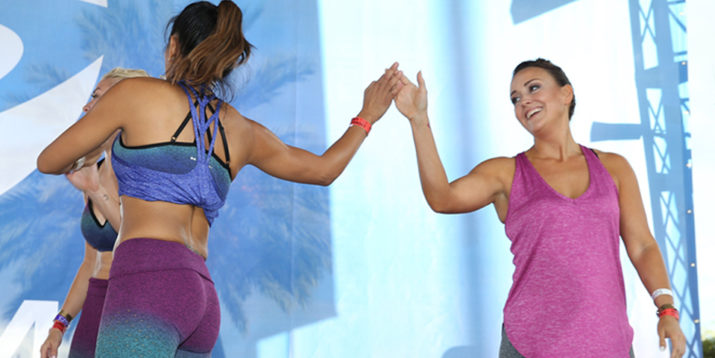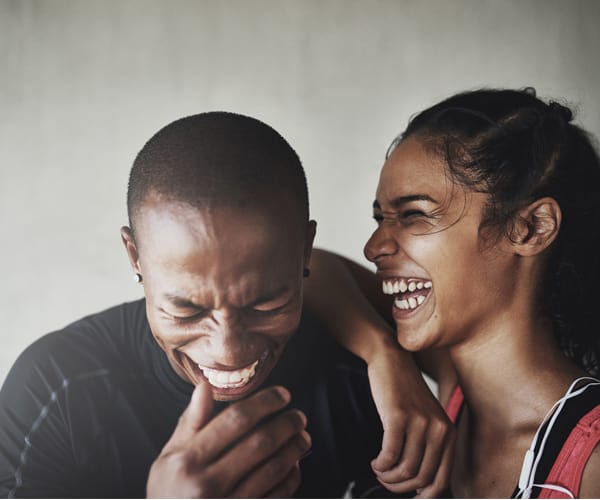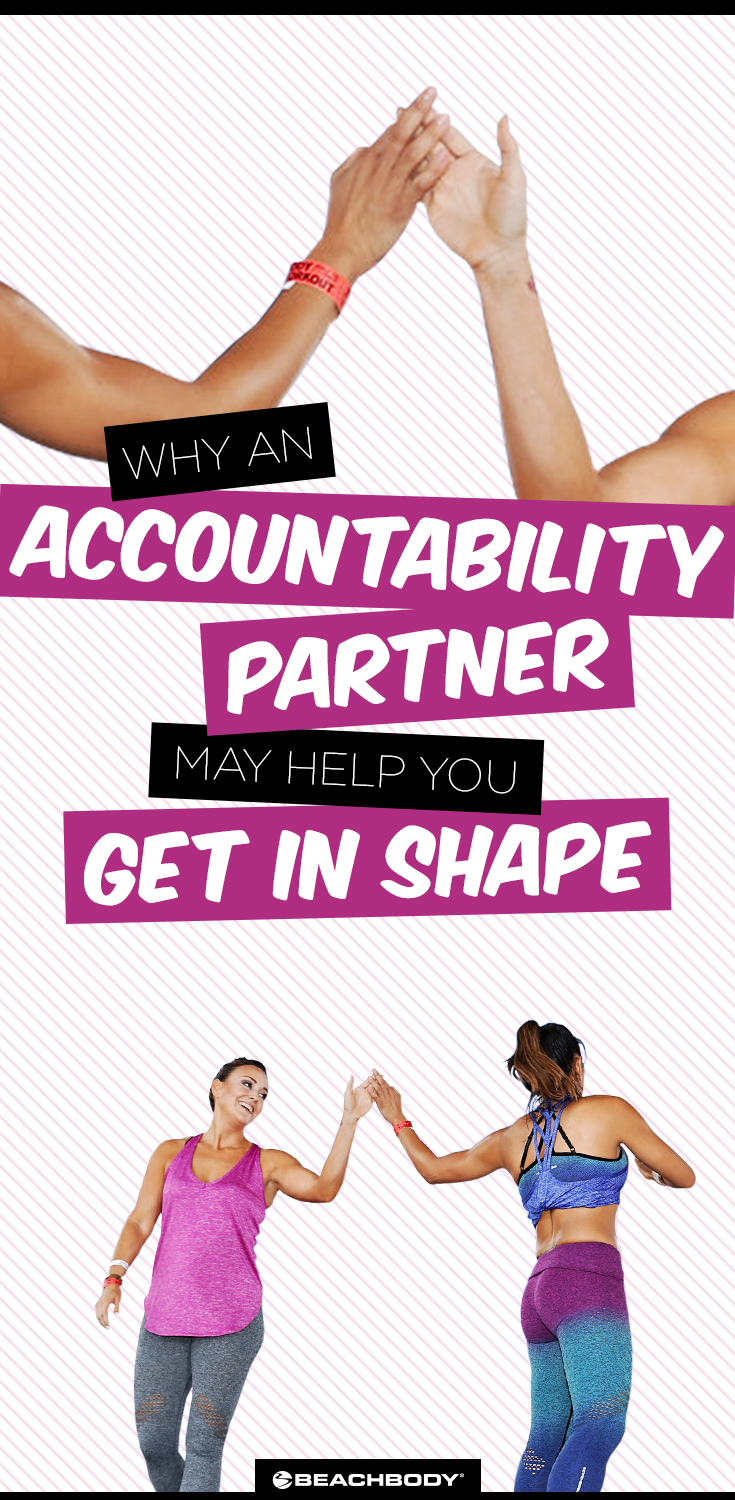Why an Accountability Partner Can Help You Get In Shape

Chances are you already know what you need to do to get in shape: Eat right, sweat often, drink enough water, and get enough sleep.
Weight loss can seem like a math problem: Burn more calories than you consume and you’ll see results!
But the reason why that seems so hard to do is because most people are missing a crucial part of the equation: an accountability partner.
“Having an accountability person or group gives you that extra ‘oomph’ of encouragement and motivation to get your workouts in,” says BODi Partner Amy Rada. “It’s key to continuing your fitness journey and make it a lifelong commitment.”
Why You Need an Accountability Partner
While the calories-in, calories-out thing is technically true, it’s not foolproof — it doesn’t account for the real-life mental obstacles we all struggle against, like lazy days, comfort foods, stressful schedules, and blah moods.
No matter how excited you start off, eventually, you’re going to have a day (or a week, or a month) where your motivation wanes and your excuses win out… unless you have a plan in place to overcome those psychological challenges.
That’s where accountability partners can swoop in and save the day.
And that’s why they’re an integral part of BODi programs, in the form of BODi Partners.
These are individuals who will support, encourage, and motivate you to reach your goals, whether that’s completing a BODi workout program, pushing past a plateau, or just eating healthier.
“It’s way too easy to give up when life gets in the way,” says BODi Partner Erica Tehonica. “You need someone to check in with you on a daily basis because motivation can be fleeting.”
Accountability is the catalyst for creating lifelong habits you’ll need to practice with consistency to achieve — and maintain — the ideal healthy lifestyle for you.
Here are a few ways you can integrate accountability into your health and fitness arsenal, and why an accountability partner in the form of a BODi Partner might be just the thing you’ve been missing on your journey to living a healthier life.
7 Tips to Make Getting Healthy Easier
Set Small(er) Goals
Before you get started, turn your big-picture goals into small, measurable steps.
Not only will this give you a solid game plan and stop you from getting overwhelmed, but smaller goals also make it easier to hold yourself accountable.
“If you have 50 pounds to lose, break it up,” Tehonica says. “Focus on the first five pounds and reward yourself when you reach that goal.”
She encourages people to choose rewards that aren’t related to food and pick something like getting a manicure or a new pair of shoes.
You also don’t need to focus solely on the scale.
“I’m a firm believer that you shouldn’t always focus on the weight,” Rada says. “Look at the changes in photos, in how you feel, or how your clothes fit.”
Non-scale victories can be huge indicators that you’re reaching your goals and can help keep your motivation levels high.
Record Your Progress
It’s way too easy to let a rest day turn into a rest week if you’re not keeping a record of your efforts through a workout log, a bullet journal, or a fitness app.
Doing so lets you know where you started, how you’re progressing, and where you were in the program when you achieved certain milestones.
One study found that people who successfully lost weight often used accountability apps — especially if those apps included frequent weigh-ins.
The key is to find an app that addresses your specific short-term goals, whether that’s meal planning, calorie counting, or tracking your workout schedule.
And don’t forget the photos!
Rada encourages people to take “before” photos at the start of their journey to help them stay focused on their goal.
“I call these ‘goodbye’ photos,” she says. “When I first started, I was taking pics every three days. That kept me eating clean and giving 100% because I wanted to see that progress.”
Recruit an Accountability Partner

Studies have shown that people are more likely to stick to a weight-loss program when they have social support.
It makes sense — we’re all guilty of occasionally putting our own goals on the back burner, but it’s a lot harder to let a friend down.
Use that to your advantage by finding a workout buddy who will hold you accountable when you slack off — and inspire you to get back on track.
Your accountability partner doesn’t need to live in the same city as you.
Rada hosts morning sessions with her Groups to motivate everyone to get their workouts in bright and early.
“Anyone can hop on and workout virtually,” she says. “Being seen and knowing that other people are getting their workouts in…that really gives you an extra push to get your workout done, too.”
Find an Online Support Group
If you’re skeptical that an online support system is an effective way to stay accountable, consider this:
Research has found that participants in online weight-loss communities can provide mutual accountability based on shared experiences, which can spark encouragement and motivation to keep going.
“Community makes you feel like you’re not alone,” Tehonica says. “Even if people don’t like to post themselves, they’ll still look at the group and see other people working hard, and it inspires them to get up and do something.”
An active online community shows you there are so many other people going through the same thing as you are, and you don’t have to feel like you’re alone in reaching your goals.
“It really brings that human aspect into it,” she adds.
Sharing your goals — and your progress — through a blog or social media can be an effective strategy for accountability.
After all, if having a fitness buddy helps, imagine the power of having a few hundred (or thousand) people supporting your progress.
You may find yourself trying a new Shakeology recipe or hitting up a hip-hop dance class just so you have something to post about!
Just keep in mind that public posting isn’t for the faint of heart. Just ask… well, pretty much any fitblogger ever.
Some people take pride in proving the trolls wrong, but for others, the negativity can be hard to tune out
“Posting before and after pictures can be scary,” Tehonica says. “Even if you’re not ready to share in a group, I encourage that you share it with your coach. That’s a safe place, and the before and after pictures help you see your progress.”
Be a Good Accountability Partner for Someone Else
We’re treading on cheesy-motivational-poster turf here, but if you want to have a good support system, you need to be a good support system.
If your fitness buddy falls off the weight-loss wagon, they’re probably not going to do a great job of holding you accountable.
“Some people need specific, daily check-ins. Rather than saying how are you doing, I like to ask my group members specific questions like what their favorite part of the workout was, or what they struggled with,” Tehonica says. “That helps to keep people more honest and focused.”
Be Your Own Cheerleader

No matter how strong your support system is, at the end of the day, you need to hold yourself accountable.
Ultimately, you’re the one who decides what you eat for breakfast or whether you tackle tough workout, so figure out what keeps you accountable — whether it’s peer pressure, gym selfies, a food diary, or a workout log — and use it to hold yourself to your healthy goals.
“It’s important to focus on the mindset of your journey rather than just trying to lose weight or gain muscle,” Rada says. “Focus on your reason why you’re doing this, why you push play. This isn’t just a quick fix – it’s a lifelong journey.”
The 20-Second Takeaway
Accountability is a key part of successful weight loss.
It drives you to practice all of the small daily choices — such as eating an apple instead of a cookie, doing your workout, and taking the stairs instead of the elevator — that eventually add up to the consistent behaviors that result in a healthier you.
Keep practicing these consistent habits until they stop feeling like conscious choices and start feeling like preferences, and you won’t be tempted to digress into the old ways that contributed to your weight gain in the first place.
“I had always been a yo-yo exerciser without the support system, and I always seemed to fall off track when I only answered to myself,” Rada says.
“The BODi community makes me never want to give up because I have people cheering me on and I want to encourage other people too.”
Head over to BODi today to get set up with the ultimate accountability partner – your very own Partner!

